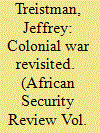| Srl | Item |
| 1 |
ID:
117648


|
|
|
|
|
| Publication |
2012.
|
| Summary/Abstract |
The Carnation Revolution on 25 April 1974 toppled the authoritarian regime in Lisbon. It is fallacious to conclude, however, that the 1974 coup d'état signaled Portugal's defeat in the Colonial War. The status of each conflict on the eve of the Carnation Revolution varied, and it was by no means inevitable that Portugal would have been defeated in all three theatres had the coup not occurred. This brief research note therefore advances a novel approach to examining the Colonial War by assessing the outcomes prior to the 1974 coup. In particular, the author proposes that Portugal achieved military victory in Angola and Mozambique, but was defeated in Guinea-Bissau.
|
|
|
|
|
|
|
|
|
|
|
|
|
|
|
|
| 2 |
ID:
114864


|
|
|
|
|
| Publication |
2012.
|
| Summary/Abstract |
The aim of this article is to obtain a better understanding of the outcomes of counterinsurgency warfare. It advances the hypothesis that the combined presence of a unified revolutionary force and external sanctuary will significantly increase the chances of victory for insurgents. The variables are tested against Portugal's involvement in the Colonial War, accounting for Portuguese defeat in Guinea-Bissau. The article concludes by extending the hypothesis to the wars in Iraq and Afghanistan, determining that the ability of the United States to succeed in Afghanistan is limited unless it seals the border with Pakistan and weakens the unity of insurgent forces.
|
|
|
|
|
|
|
|
|
|
|
|
|
|
|
|
| 3 |
ID:
140258


|
|
|
|
|
| Summary/Abstract |
This study investigates the effect that US medical personnel deaths in combat have on other unit deaths and ‘military success,’ which we measure using commendation medals as a proxy. We use a difference-in-differences identification strategy, measuring the changes over time in these outcomes following the combat loss of a medic or doctor and comparing it to the changes following the combat loss of a soldier who is not a medic or doctor. We find that overall unit deaths decrease in the five or ten days following the deaths of medical personnel in Vietnam, Korea, and the Pacific theater in World War II (WWII). In contrast, the WWII European and North African results indicate that overall unit deaths rise following medical personnel deaths. We find no relationship between medical personnel deaths and other unit deaths in Iraq and Afghanistan. For Korea and the Pacific theater of WWII, our estimates suggest unit commendation medals decrease following the deaths of medical personnel. This pattern of evidence is consistent with a model in which units often halted aggressive tactical maneuvers and reduced pursuit of their military objectives until deceased medical personnel were replaced. The results for the other conflicts are mixed and show little connection between medical personnel deaths and commendation medals.
|
|
|
|
|
|
|
|
|
|
|
|
|
|
|
|